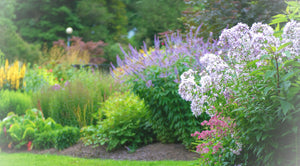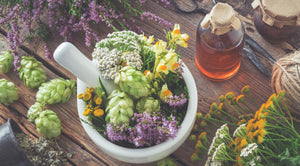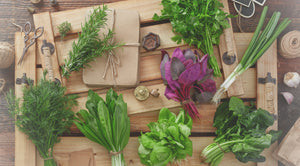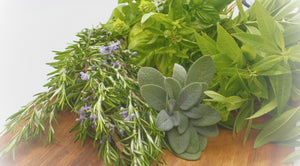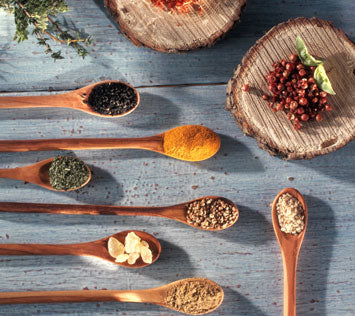LEMON VERBENA:
One of my favorite 'lemon herbs', this herb plant has the most intense, lemon-like scent of all the lemon scented herbs. A tender perennial, lemon verbena is hardy from Zone 9 - 11 . It can reach over 5' where hardy. For most of us, it is not hardy, therefore keep lemon verbena as a potted plant and move it indoors before frost. Lemon verbena will often drop all its leaves when moved indoors in fall. It dislikes the sudden change to different conditions. Be patient, keep a little on the dry side, and it will usually put out new leaves.
Lemon verbena is also useful for topiary work, making nice large standards. Full sun is a must, and keep the soil moist. Fertilize during the growing season with fish emulsion and keep it well pruned. Give it an even more severe cut in the fall; during the winter it will become dormant so keep the soil barely moist.
LEMON THYME:
Beautiful in the garden, fragrant and useful, Lemon Thyme, is another of the most popular lemon scented herbs. Like most Thyme varieties, this is a sun-loving, ground hugging culinary herb with foliage that emits a wonderful lime fragrance when it is brushed or rubbed. Substitute lemon thyme in your thyme recipes for a delightful change of pace. This thyme is a fine addition to the herb garden. It is also a great container plant, either alone in a 10" pot or as part of an herbal ensemble in a larger container.
Lemon Thyme definitely smells and tastes like lemon. It can be used in any recipe calling for lemon or lime juice, lemon zest or lemon flavoring. It grows like a weed so there is always more waiting in the garden. Lemon Thyme added to marinade is great with fish or chicken. Lemon Thyme's glossy green foliage can be sheared to form one of the knots in a traditional knot garden.
LEMONGRASS
Lemon Grass is a beautiful tropical grass which has a citronella type flavor that is used primarily in Southeast Asian cooking. This herb plant will grow to about 2-3 feet around and 6 feet tall! Lemon grass loves sunshine and moisture.
This sturdy tender perennial can be used as a dramatic structural element in all gardens. A native of the East Asian tropics, this is an herb plant that thrives in hot and humid summers. Even a 4" pot of lemongrass planted out in spring will make a large, attractive clump by fall, giving you lots of lemon-y scented grass to harvest and dry for winter use in teas, potpourri and cooking.

If you live in a milder climate, you can put Lemon grass in the ground in a sunny area and mulch very well to protect its roots from winter cold. If you live up north, plant in large containers with potting soil and bring it indoors in winter.
To harvest Lemon grass, cut the oldest stalks at the base of the plant leaving the smaller ones to grow. Use it fresh or it can be dried or frozen. To use Lemon grass in cooking chop the stalks into large pieces and bruise them with the back of the knife to release their flavor. Cook into broths or roast them to extract their flavor and then remove the stalks like a bay leaf. Most Thai hot & spicy soups call for Lemon grass as a primary ingredient as well as many Vietnamese recipes.
LEMON CATNIP
Lemon Catnip is a bit better behaved than the common ornamental catnips. This lemon scented herb plant grows to about 3' tall and has white flowers in mid-summer. Lemon catnip is easily grown from seed, cuttings or root divisions, preferably to grow in dry areas. It has tall stems 2-3 ft., limey gray green leaves, white flowers, and a strong lemon fragrance. Both catnip and lemon catnip are herb plants used in teas. Lemon scented catnip makes tea wonderful, gives a refreshing lemony flavor.

It is used fresh or dry. It depends on you to make pure lemon catnip tea or to mix different herbs or just add some leaves as drink additives. You may drink the herbal teas hot or cold, with ice, sweeten slightly if desired. Some prefer tea with honey and lemon.
You may drink lemon catnip tea in case of a cold. It really helps with your restless sleep at night, the lemony smell will make you relax. The catnip herb is calming, relaxing. Some say it promotes beauty and mirth, brings you positive energy. To make that wonderful tea is easy as common tea.
The easiest way is to take a handful of herbs, to roll them and pour boiling water over, but not to boil the herb; allow to steep for a few minutes and the lemon catnip tea is ready. Pregnant women should avoid this herb, and be careful in general and should consult their doctor about the use of any herb. Also, the persons who are prone to allergic reactions should also be very careful about the use of any herbal tea.
Dried or fresh, this plant will make any feline ecstatic! This catnip has a wonderful lemon aroma, and works as a wonderful container plant. Lemon Catnip is a great companion plant to any annual or herb or perennial you have in a grouping. It is known to deter aphids and several types of beetles.
Eucalyptus Lemon Bush
This Australian native plant with grey green sword-shaped leaves and produces tiny white flowers. When you think of Eucalyptus you think of a certain smell, well throw that out the window with this Eucalyptus.
This plant has is full of lemon scent stronger than most lemon smelling herbs!
Here's a little fact you can share with friends when admiring this plant, if you own a citronella candle to help with those pesky mosquitos in the summer time. They actually use the oils from this plant to help with the fragrance!
In the late summer/ early fall months this beauty leaves start to turn an eye catching red. That is perfect to use as filler in bouquets and flower arrangements to give them that extra pop of uniqueness.
